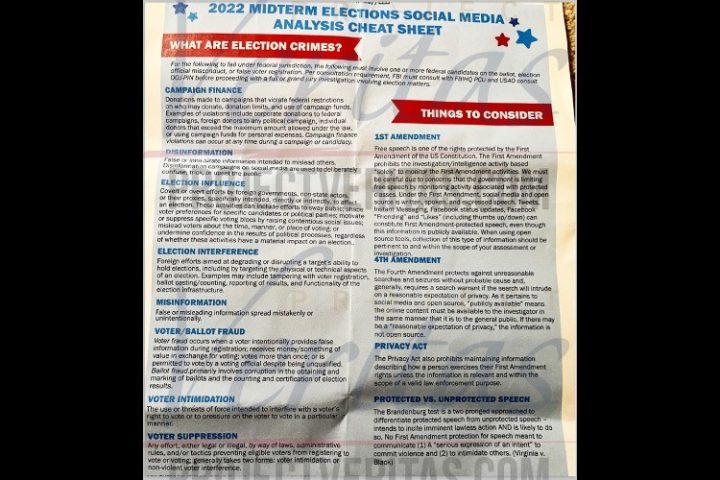
Watch what you say on Facebook or Twitter about the midterm elections on November 8.
The FBI is watching, and just waiting to arrest you for the “crime” of spreading “disinformation” and “misinformation.” And given the bureau’s zeal in arresting pro-life protesters, it might just ignore the First Amendment to the federal Constitution to do it.
Those two crimes are included in a document that instructs agents to hunt down election criminals. An FBI whistleblower gave the document to Project Veritas.
No “Confusing” or “Tricking” the Public
The FBI document is something of an irony given that many agents, top FBI officials have complained, didn’t believe the Democrats’ January 6 insurrection narrative.
So why the top brass would believe patriotic agents would raid a 70-year-old granny for posting “disinformation” is a mystery.
“Disinformation” is “false or inaccurate information intended to mislead others,” the document says:
Disinformation campaigns on social media are used to deliberately confuse, trick, or upset the public.
“Misinformation,” on the other hand, is “false or misleading information spread mistakenly or unintentionally.”

An obvious concern about the FBI’s calling them “election crimes” is whether that granny can be locked up for inadvertently tweeting that the election is on November 9. Maybe the bureau will arrest a political activist for posting ballot information he believes to be true.
The document notes that the First Amendment protects speech, but then warns that not all speech is protected:
The Brandenburg test is a two pronged approached [sic] to differentiate protected speech from unprotected speech — intends to incite imminent lawless action AND is likely to do so. No First Amendment protection for speech meant to communicate (1) A “serious expression of an intent” to commit violence and (2) to intimidate others.
Voter fraud “occurs when a voter intentionally provides false information during registration,” the document says, or “receives money/something of value in exchange for voting; votes more than once; or is permitted to vote by a voting official despite being unqualified.”
The document does discuss real election crimes. But, again, particularly problematic is its focus on speech, especially given the revelation that Facebook, at the request of the FBI, clamped down on “disinformation.” That “disinformation” was news of Hunter Biden’s laptop, which Facebook suppressed to protect Joe Biden’s presidential effort.
The obvious question is who decides what constitutes “disinformation” or “misinformation.”
Another FBI Fail
The latest is yet another major wound for the once-storied law-enforcement agency that was the subject of adoring Hollywood films.
Revelations during the past few years suggest that the image once burnished by fictional characters such as Jimmy Stewart’s middle-class hero Chip Hardesty, or Dale Robertson’s take on the very real Melvin Purvis, the “G-Man” who led the manhunts for John Dillinger, Baby Face Nelson, and Pretty Boy Floyd, is gone.
Again, the bureau recently conducted an over-the-top raid at a pro-life activist’s home. The activist had protected his son from a deranged pro-abort who appeared ready to attack the activist’s son.
As well, a recently released internal email showed that FBI leaders were highly concerned that the rank-and-file didn’t buy the hysterical leftist narrative about the mostly peaceful protest on January 6, 2021 at the U.S. Capitol. Agents, apparently, don’t believe it was an “insurrection,” or “worse than 9/11,” or the “worst attack on our democracy since the Civil War.” Instead, agents were more worried about Antifa-Black Lives Matter terrorists who had burned and pillaged American cities.
The agency deep-sixed the probe into the incriminating laptop that revealed Joe Biden’s financial connection to Chinese Reds and deep involvement in his son’s shady business practices. Worse still, the agents charged with squelching the probe were Democratic donors.
The agency offered up to $1 million to British spy Christopher Steele if he could prove the bogus tales in his infamous “dossier,” which the FBI used to obtain a wiretap on a Trump presidential campaign official. Steele created the dossier at the behest of a cutout for Hillary Clinton’s presidential campaign, which conceived the Russia Collusion Hoax to derail Trump’s campaign. The hoax then became a preoccupation of the Democrats and their Media Information Ministry for Trump’s whole term.
Top bureau personnel also seriously discussed persuading Cabinet members to invoke the 25th Amendment to declare Trump incapable of fulfilling his duties.
Leftist legal celebrity Alan Dershowitz called the move an “attempted coup d’état” and “attack on our Constitution.”



